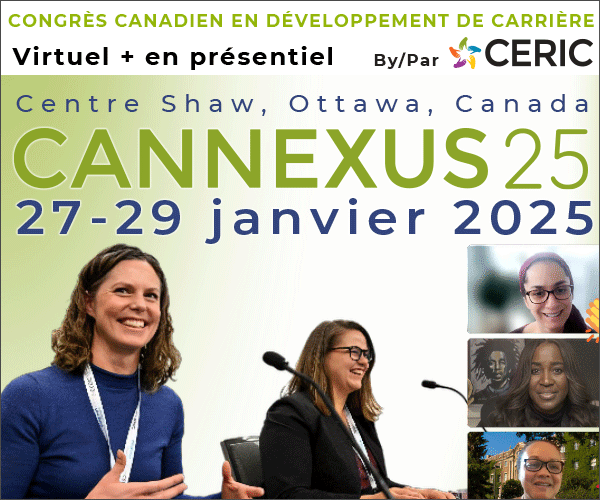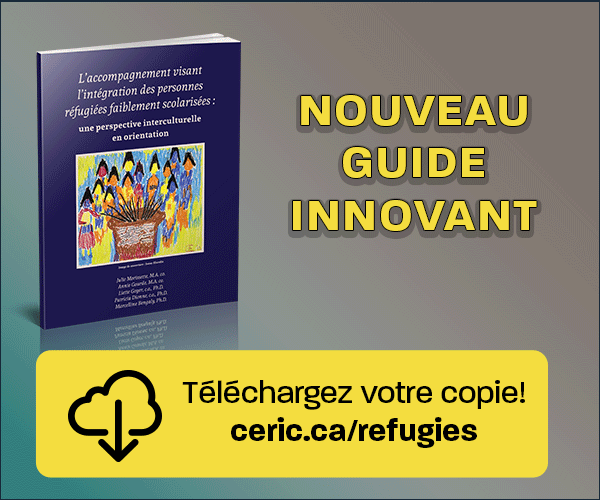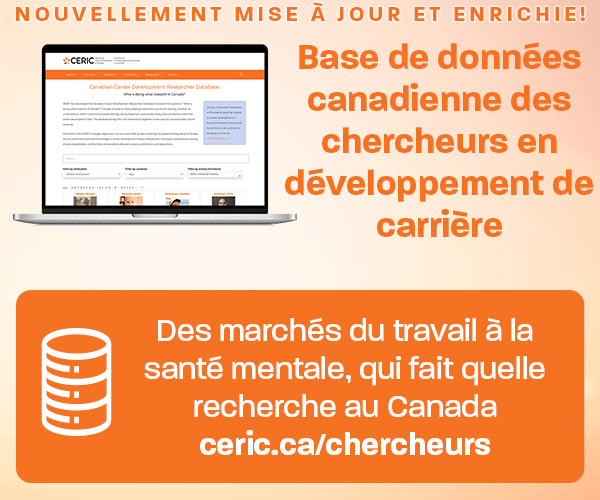Bâtir l’avenir dans les espaces liminaux entre l’adolescence et l’âge adulte : responsabilités, carrières et contextes sociaux
Mots-clés :
futur, espaces liminaires, adolscence, l'âge adulte, carrières, contexte social, responsabilitésRésumé
The following paper explore the way a sample of young people in New Brunswick constructed, conceptualized and expressed concerns about adulthood, in relation to their career aspirations and their socio-economic context. The notion of liminal adulthood is used to frame the discussion in order to capture the in-between spaces of vocational identity. Furthermore we explore how these spaces are historically and socially constructed.
Références
Andres, L., Anisef, P., Krahn, H., Looker, D., & Thiessen, V. (1999). The persistence of social structure: Cohort, class and gender effects on the occupational aspirations and expectations of canadian youth. Journal of Youth Studies, 2(3), 261-282.
Arnett, J. J. (2000). Emerging adulthood: A theory of development from the late teens through the twenties. American Psychologist, 55, 469- 480.
Aronson, P. (2008). The markers and meanings of growing up: Contemporary young women’s transitions from adolescence to adulthood. Gender and Society, 22(1), 56-82.
Baxter Magolda, M. B. (2008). Three elements of self-authorship. Journal of College Student Development, 49, 269-284. DOI:10.1353/csd.0.0016
Beck, U. (2000). The brave new world of work. Malden, Mass.: Polity Press.
Benjamin, A. (2012) Listening in the Liminal: In Between Spaces in Critical Qualitative Research with Youth (p). In G. S. Cannella & S. Steinberg (Eds.), The Critical Qualitative Research Reader (CQR). New York: Peter Lang Publishing.
Blatterer, H. (2007). Coming of age in times of uncertainty. New York: Berghahn Books.
Blatterer, H. (2010). Contemporary adulthood and the devolving life course. In H. Blatterer & J. Glahn (Eds.), Times of our lives: Making sense of growing up & growing old. Oxford: The Inter-Disciplinary Press.
Borgen, W. A., Amundson, N. E., & McVicar, J. (2002). the experience of unemployment for fishery workers in newfoundland: what helps and hinders. Journal Of Employment
Bové,, P. (1990). Discourse. In F. Lentricchia & T. McLaughlin (Eds.), Critical terms for literary study (pp. 50-65). Chicago: University of Chicago Press.
Corbett, M. (2004). It was fine, if you wanted to leave’: Educational ambivalence in a Nova Scotian coastal community 1963-1998. Anthropology & Education Quarterly, 35, 451- 471.
Corbett, M. (2007). Travels in space and place: Identity and rural schooling. Canadian Journal Of Education, 30, 771-792. doi:10.2307/20466662
Côté, J. E., & Levine, C. (1988). A critical examination of the ego identity status paradigm. Developmental Review, 8, 147-184.
Creamer, E. G. & Lauglin, A. (2005). Self-authorship and women’s decision-making. Journal of College Student Development, 46, 13-27. DOI: 10.1353/csd.2005.0002
Eccles, J. S., & Wigfield, A.-. (2002). Motivational beliefs, values and goals. Annual Review of Psychology, 53, 109-132.
Erikson, E. (1956). The problem of ego identity. Journal of the American Psychoanalytic Association, 4, 56-121.
European Group for Integrated Social Research (EGRIS) (2001). Misleading trajectories: Transition dilemmas of young adults in europe. Journal of youth studies, 4(1), 101-118.
Foucault, M. (1972). The archaeology of knowledge. London: Tavistock Publications.
Furlong, A. (2005). Cultural dimensions of decisions about educational participation among 14- to 19-yearolds: The parts that tomlinson doesn’t reach. Journal of Education Policy, 20(3), 379.
Furlong, A., & Biggart, A. (1999). Framing “Choices”: A longitudinal study of occupational aspirations among 13- to 16-year-olds. Journal of Education and Work, 12(1), 21.
Gati, I., Krausz, M., & Osipow, S. H. (1996). A taxonomy of difficulties in career decision-making. Journal of Counselling Psychology, 43, 510-526.
Jeffery, G. H., Lehr, R., Hache, G., & Campbell, M. (1992). Empowering rural parents to support youth career development: An interim report. Canadian Journal Of Counselling, 26, 240-255.
Kegan, R. (1994). In over our heads: The mental demands of modern life. Cambridge, MA: Harvard University Press.
Kroger, J., Martinussen, M., & Marcia, J. E. (2010). Identity status change during adolescence and young adulthood: A meta-analysis. Journal Of Adolescence, 33, 683-698. doi:10.1016/j.adolescence.2009.11.002
Luke, A. (1995). Text as discourse in education: An introduction to critical discourse analysis. In M. Apple (Ed.), Review of research in education (Vol. 21).
Marcia, J. E. (1966). Development and validation of ego-identity status. Journal of Personality and Social Psychology, 3(5), 551-558.
MacBeth, D. (2001). On “reflexivity” in qualitative research: Two readings, and a third. Qualitative Inquiry, 7(1), 35–69.
Morgan, T., & Ness, D. (2003). Career decision-making difficulties of first year students. . The Canadian Journal of Career Development, 21(1), 33-39.
Morrison Gutman, L., & Akerman, R. (2008). Determinants of aspirations London: Department for Children, Schools and Families.
Nelson, L. J., & Barry, C. M. (2005). Distinguishing features of emerging adulthood: The role of self-classification as an adult. Journal of Adolescent Research, 20, 242-262.
Osipow, S. (1999). Assessing career indecision. Journal of Vocational Behavior, 55, 147-154.
Osipow, S., Carney, C., Winer, J., Yanico, B., & Koschier, M. (1976). The career decision scale. Odessa, FL: Psychological Assessment Resources.
Phillips, L., & Jørgenson, M. (2002). Discourse analysis as theory and method. London: Sage Publications.
Raby, R. (2010). Theorising liminal adulthood and its consequences for childhood, youth and adulthood In H. Blatterer & J. Glahn (Eds.), Times of our lives: Making sense of growing up & growing old. Oxford, United Kingdom: The Inter-Disciplinary Press.
Schlossberg, N. (1987). Taking the mystery out of change. Psychology Today, May, 74-75.
Skorikov, V., & Vondracek, F. W. (1998). Vocational identity development: Its relationship to other identity domains and to overall identity development. Journal of Career Assessment, 6(1), 13-35.
Springer, K. J., & Kerpelman, J. L. (2010). Career identity development in college students: Decision making, parental support, and work experience. Identity: An International Journal of Theory and Research(10), 181-200.
St Clair, R., & Benjamin, A. (2011). Performing desires: The dilemma of aspirations and educational attainment. British Educational Research Journal, 37(3), 501-517.
Turok, I., Kintrea, K., St Clair, R., & Benjamin, A. (2008). Interim report for shaping educational attitudes and aspirations: The influence of parents, place and poverty. York: York Publishing Service.
Weedon, C. (1997). Feminist practice and poststructuralist theory. New York, NY: Blackwell.
Wyn, J., & White, R. (1997). Rethinking youth. London: Sage Publications.
Young, R. A., Valach, L., Marshall, S. K., Domene, J. F., Graham, M. D., & Zaidman-Zait, A. (2010). Transition to adulthood: Action, projects and counseling. New York:
Springer.
Young, R. A., Marshall, S. K., Valach, L., Domene, J. F., Graham, M. D., & Zaidman-Zait, A. (2011). Transition to adulthood: Action, projects, and counseling. New York: Springer

Téléchargements
Publié-e
Comment citer
Numéro
Rubrique
Licence

Cette œuvre est sous licence Creative Commons Attribution - Pas d'Utilisation Commerciale - Pas de Modification 4.0 International.











